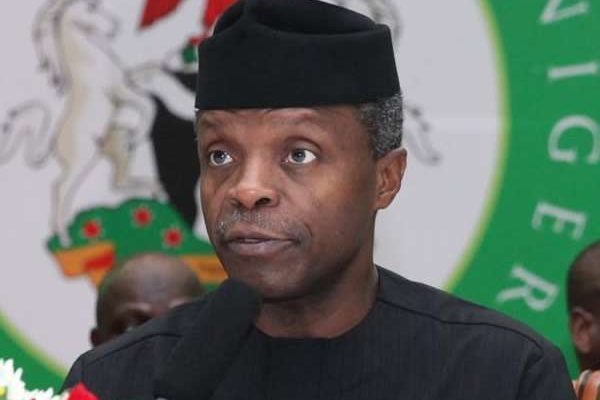Boundary Disputes: Osinbajo Summons Deputy Govs To Aso Rock
Vice President Yemi Osinbajo on Monday summoned the 36 deputy governors to the Presidential Villa, Abuja over boundary disputes among different states.
Prof. Osinbajo at the meeting that took place at the Old Banquet Hall, faulted some politicians whom he said “play ethnic or religious games” to exacerbate otherwise straightforward issues resulting in violence and death.
He charged the National Boundaries Commission, NBC, to step up its vital role in managing geographic boundaries in order to prevent border conflicts.
The Vice President, who is also Chairman of the NBC said it has become expedient to convene the meeting to enable all stakeholders in boundary disputes to understand the Act establishing the NBC and their roles to ensure proper boundary management.
The NBC was established under CAP 238 of 1990 and is responsible for managing internal boundaries among states and external borders between Nigeria and other countries. It is also responsible for preventing the inflow of contraband and illegal materials into the country.
He said, “We cannot stress this enough. Land is an emotive issue. And it accounts for many cases of the mindless violence and fatalities that result from border disputes and clashes. For many of our people, it is the very essence of their identity—the whole question of who owns what and who should have access to a particular piece of land. Sometimes it is tied to ancestry and ancient rivalries.
“But most of these combatants do not understand that many of these boundary lines are mainly for administrative convenience. And there should not be disputes about them, and even if there are, it should not lead to violence or the dislocation of people.
“Very often, we observe where politicians play ethnic or religious games which exacerbates otherwise straightforward issues and may result in violence and death. I believe that we are a responsible leadership that can sit at the table with other leaders and agree to give and take, and make concessions.”
Osinbajo explained that the meeting became necessary to settle disputes and minimise interstate rancour and instability by interacting directly with the responsible state functionaries and getting a better sense of how they think their border disputes could be more efficiently and successfully tackled.
According to him, “I fully agree that such an interaction is necessary after all the users of the commission’s services are best suited to give helpful feedback.
“Such interaction will be an opportunity to jointly review the commission’s work so far and to chart a course to the peaceful management of our interstate boundaries.
“So, the handling of border disputes also requires a good knowledge of the issues, and in my view, sincerity of purpose and sensitivity. And this can only be effectively done at the highest levels of governance.
“Which is why the National Boundary Commission Establishment Act of 2006 provides organs at the three levels of government. But in particular, it establishes state boundary committees that are headed by deputy governors in every one of the states.
“And, of course, the permanent secretaries in the FCT. While the VP chairs the NBC, which is the apex body for resolving border disputes.”
Continuing, he said that bold, fair-minded, trustworthy, courageous and patriotic leadership is required to ensure that border disputes are settled without politicisation.
He charged the zonal commissioners of the NBC on their mandate saying, “I believe that in this challenging but crucial enterprise, the border commission has a vital role to play. Its role is sensitive. It’s not just an expert body. But it is also expected to be an honest broker. This is why we have the honourable members of the commission who are from all six geopolitical zones.
“The commission is a public resource whose credibility in dispute resolution is fundamental, we all have a duty to support the commission but also to keep it honest and on its toes all the time because the role of the commission is central to everything we do in border dispute resolution.”




